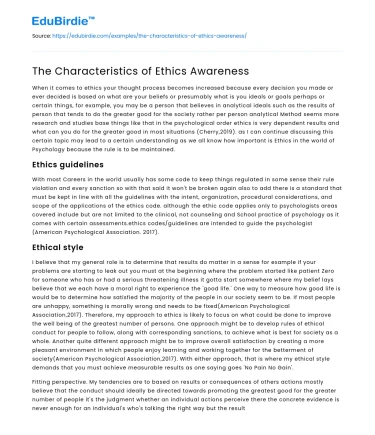Introduction
Ethical awareness is a fundamental aspect of decision-making and behavior in both personal and professional contexts. It refers to the ability to recognize ethical issues and dilemmas, evaluate the potential consequences of different actions, and choose the most morally acceptable course of action. In a world characterized by complex social, economic, and technological interactions, the need for heightened ethical awareness has become more pronounced. Ethical awareness involves a blend of cognitive and emotional elements, requiring individuals to not only analyze situations logically but also empathize with the affected parties. It is imperative for individuals to cultivate ethical awareness to foster integrity, accountability, and trustworthiness. This essay explores the characteristics of ethical awareness, identifying the cognitive and emotional components that contribute to ethical decision-making. By examining real-life cases and counter-arguments, the essay aims to provide a comprehensive understanding of what constitutes ethical awareness and its significance in contemporary society.
Cognitive Aspects of Ethical Awareness
The cognitive dimension of ethical awareness involves the intellectual processes required to identify and evaluate ethical issues. This aspect is grounded in moral reasoning, which allows individuals to discern right from wrong and make choices based on ethical principles. According to Kohlberg's stages of moral development, individuals progress through different levels of moral reasoning, from a pre-conventional stage focused on self-interest to a post-conventional stage characterized by adherence to universal ethical principles (Kohlberg, 1981). In a professional setting, cognitive ethical awareness is essential for navigating complex situations where the right course of action may not be immediately clear. For example, in business, leaders must weigh the interests of stakeholders, legal requirements, and corporate social responsibility when making decisions. The case of the Volkswagen emissions scandal illustrates the consequences of a lapse in cognitive ethical awareness. Executives at Volkswagen made a calculated decision to manipulate emissions tests, prioritizing profit over ethical responsibility, which ultimately resulted in significant legal and reputational repercussions.
Moreover, cognitive ethical awareness is not static but can be developed through education and experience. Ethics training programs and workshops are designed to enhance individuals' ability to recognize ethical dilemmas and apply ethical frameworks effectively. The integration of case studies, role-playing, and reflective practices in such programs can significantly improve moral reasoning skills. Critics, however, argue that cognitive ethical awareness alone is insufficient because it does not account for the emotional and social factors that influence ethical behavior (Rest, 1986). They contend that without the ability to empathize and understand the emotional impact of decisions, cognitive processes may lead to overly analytical and detached moral judgments. Despite these criticisms, the cognitive aspect remains a crucial component of ethical awareness, providing the foundation for informed and principled decision-making.
Emotional and Social Dimensions of Ethical Awareness
Beyond cognitive processes, ethical awareness encompasses emotional and social dimensions that are vital for a comprehensive understanding of ethical behavior. Emotional intelligence, which includes the ability to empathize, regulate emotions, and understand others' perspectives, plays a critical role in ethical awareness (Goleman, 1995). Empathy, in particular, allows individuals to anticipate the impact of their decisions on others, promoting ethical behavior that prioritizes the well-being of affected parties. A real-life example of the influence of emotional awareness on ethical decision-making is the response of Tylenol to the cyanide poisoning crisis in 1982. Johnson & Johnson demonstrated a high level of emotional and social awareness by prioritizing consumer safety and transparency over financial loss, ultimately restoring public trust.
Social awareness is another critical component of ethical behavior, as it involves understanding the broader societal implications of one's actions. This awareness is informed by cultural norms, social expectations, and community values, which can vary significantly across different contexts. Ethical awareness in diverse cultural settings requires sensitivity to these differences and a commitment to respectful and inclusive decision-making. However, some scholars argue that the emphasis on emotional and social dimensions can lead to relativism, where ethical standards become subjective and vary widely across cultures (Williams, 2014). Nonetheless, integrating emotional and social awareness with cognitive reasoning provides a balanced approach to ethical decision-making, ensuring that decisions are both principled and compassionate.
Conclusion
In conclusion, ethical awareness is a multifaceted construct that encompasses cognitive, emotional, and social dimensions. It is essential for navigating the ethical complexities of modern life, particularly in professional settings where decisions can have far-reaching consequences. While cognitive ethical awareness provides the analytical foundation for understanding and resolving ethical dilemmas, emotional and social awareness infuse decision-making with empathy and cultural sensitivity. The interplay of these elements ensures that ethical awareness is both principled and humane, fostering trust and integrity in personal and professional relationships. As society continues to evolve, the cultivation of ethical awareness will remain a critical endeavor, enabling individuals to make informed, responsible, and compassionate choices. By addressing counter-arguments and recognizing the limitations of each dimension, this essay underscores the importance of a holistic approach to ethical awareness, one that embraces the complexity and diversity of human experience.






 Stuck on your essay?
Stuck on your essay?

